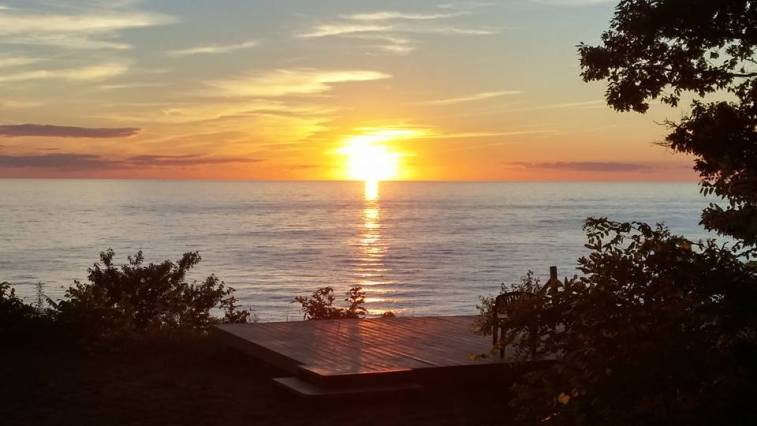Sumac and scrubby grass, dense-leaved oaks and maples, jumbles of every possible green. Blue spruce, Douglas fir, white pines, red pines, the astonishing symmetry of jack pine trunks in a sudden stand. Dead trees like skeletons rising from swamps. Everything stubby and scruffy and sassafrassy.
Highways headed north, corridored by trees. Wide, grassy, wildflowered medians. Undulating country roads sliding past cornfields, orchards, barns.
Cotton-ball clouds sailing across celestial blue. Rumply blankets of clouds, friendly poofs of clouds, angry thunder-head clouds, every kind of cloud. A sky with always something to say, intimate and close. Distant thunder. Storms brooding over lakes.
Weedy, silty lake bottoms. Weathered, splintery, makeshift docks. Snails clustered where water laps shore. A wagon wheel leaning against a fence. The bright slant of sun in the evening. Lake surface at sunset, stilled to glassy glow.
Sunburn. Windburn. Running down dunes. Climbing up dunes, calf muscles burning. Beach grass razoring ankles, dead-sharp stalks puncturing bare feet. Tender spots on soles that make you dance for days.
Swimming in freezing water, chilly water, mild water, water that’s warm once you “get used to it.” Wrinkly water, roaring water, water sparkling with light-diamonds. All the colors of water: dull brown, mediterranean blue, aqua green, steely blue-black with pink sunset trail.
Cracked vinyl on the seats of family speedboats bought used. Finicky outboard motors. Canoes and kayaks paddled down slow-moving rivers. Giant oily freighters on the horizon in big lakes.
Wind. Wind in sails, on beaches, at picnics. Wind in hair. Sand in hair, sand in shoes, sand under bare feet on ancient linoleum floors of cottages. Sand emptied from socks and pockets back at home.
Little brown birds. Queen Anne’s lace. Pots of petunias hanging from porches. Green, sloping lawns. Pulling weeds and mowing lawns, laboring red-faced and grass-spattered. Dashing patio furniture cushions under cover as the rain starts. Muddy footprints, dirty knees.
Birdies chirping at five-thirty, light lingering till ten. The kuht-chsssss kuht-chsssss of sprinklers. Kids on trampolines after dinner, neighbors on bikes, dogs chasing frisbees at the park.
Maple-tree whirlygigs in sidewalk cracks. Fuzzy hickory tassels. Birch paper peeling, crab apples dropping, honey locusts dangling sausagey pods. The whispering chatter of leathery cottonwood leaves, their tufts of sticky seed.
Sweet cherries, blueberries, every kind of berry warm from the sun. The itchy, prickly business of berries. The syrupy mess of peaches. Tomatoes just-plucked, peppery leaf-scent left on fingers. Potato salad, jello salad, burgers and dogs. Buns on plastic picnic plates.
Mayflies clustered on washroom lights, flies shooed from watermelon, moths on the window screen, mosquitos swarming. The pricking stab of a bite, the white welt.
Languid exhaustion after a day in the sun. Dark interiors after blazing outdoors. Warm showers on reddened shoulders. Lotion smoothed everywhere, clean hair, fresh t-shirts and shorts. Hooded sweatshirts at dusk.
Fires in pits fashioned from concrete blocks. Driftwood fires at the beach.
Family and friends, gathered at campground, cabin, cottage, deck, backyard, porch. Low laughter outdoors after dark. While no one’s watching, the earth tilts toward fall.
Feel free to add in the comments what you love about where you are in this season.





